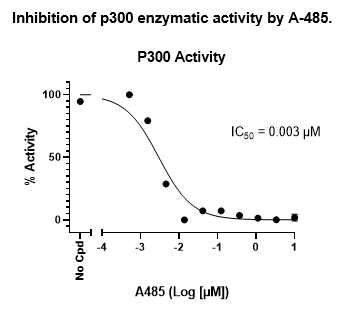P300 Homogeneous Assay Kit
The p300 Homogeneous Assay Kit contains an AlphaLISA® assay designed for screening inhibitors of p300 in a convenient 384-well format. This efficient method requires no time-consuming washing steps. Only a few steps are needed. The assay is based on the enzymatic transfer of an acetyl group from acetyl CoA to a specific lysine residue within a biotinylated peptide substrate. After incubation with p300, the sample is incubated with a combination of an antibody that specifically binds the acetylated peptide and acceptor beads that bind the antibody. This is followed by incubation with streptavidin-labeled donor beads and reading of the Alpha-counts.
- Anti-Rabbit AlphaLISA® Acceptor Beads, 5 mg/ml (PerkinElmer #AL104)
- AlphaScreen® Streptavidin-conjugated Donor Beads, 5 mg/ml (PerkinElmer #6760002)
- Optiplate -384 (PerkinElmer #6007290)
- AlphaScreen® microplate reader
- Adjustable micropipettor and sterile tips
| Catalog # | Name | Amount | Storage |
| 50071 | Human recombinant P300 enzyme* | 1 µg | -80°C |
| Acetyl CoA (0.1 mM) | 10 μl | -20°C | |
| Biotinylated H3 Peptide Substrate | 400 μl | -80°C | |
| 79708 | 2X HAT assay buffer | 10 ml | -20°C |
| 0.5 M DTT | 200 μl | -20°C | |
| 79706 | Primary Antibody 327 | 40 μl | -80°C |
| 52301 | 4X Detection Buffer 1 | 2 ml | -80°C |
*The concentration of p300 is lot-specific and will be indicated on the tube containing the enzyme.
Histone acetyltransferase p300, also known as p300 HAT or EP300, is a histone acetyltransferase that regulates gene transcription through chromatin remodeling. Therefore, p300 plays an important role in the regulation of cell proliferation or differentiation. p300 is closely related to CREB binding protein. It interacts with many transcription factors. It also mediates cAMP-gene regulation by binding specifically to the phosphorylated CREB protein. Mutations in p300 are involved in the rare genetic disease Rubinstein–Taybi syndrome and in several types of cancer, including stomach, colon, breast, and pancreatic cancer.
Trievel, R. C., et al. (2000). Anal. Biochem. 287(2):319-28.


